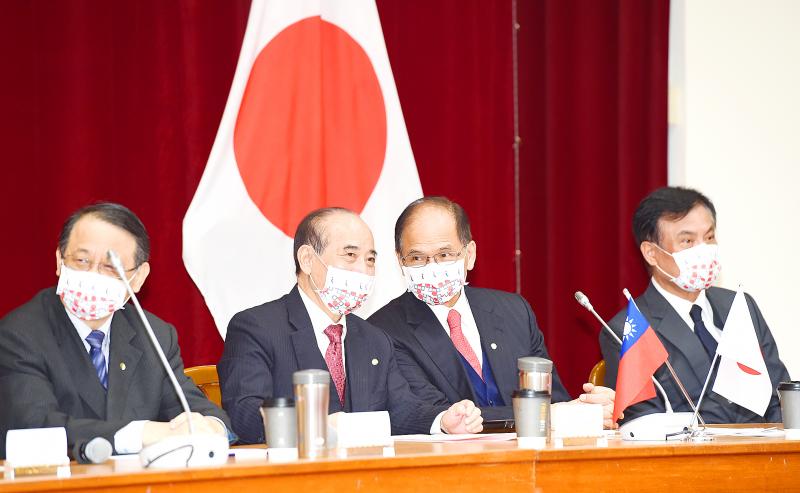The government should refer to scientific evidence when deciding whether to lift a ban on food imports from five Japanese prefectures, Legislative Speaker You Si-kun said yesterday.
You made the remarks ahead of the inauguration ceremony for the Taiwan-Japan Parliament Members Friendship Association, which comprises 95 of the 113 lawmakers in the legislature.
There has been speculation that the government plans to lift the ban it placed on food imports from the Japanese prefectures of Fukushima, Ibaraki, Tochigi, Gunma and Chiba after the 2011 Fukushima Dai-ichi nuclear power plant disaster.

Photo: Liao Chen-huei, Taipei Times
In a referendum in November 2018, a majority voted in favor of retaining the ban, but the referendum’s legality expired after two years.
Asked about the issue, You, who is the association’s chairman, said that he had not received any information from the government about lifting the ban, nor had he talked with Japanese officials about it.
Nonetheless, he would respect any decision made by the government, he said, adding that he hopes it will deliberate over the matter based on scientific evidence.
Taiwan and Japan are closely bound, especially as both are part of the first island chain, and their security affects the safety of the region, as made clear by the US’ Indo-Pacific Strategy, You said.
Taiwan People’s Party Legislator Tsai Pi-ru (蔡壁如), one of the association’s deputy chairpersons, called on the government to be discreet about the lifting the ban.
It should not repeat the poor social communication it displayed when lifting a ban on pork imports containing ractopamine, Tsai said.
Delivering his speech through video, Japan-ROC Diet Members’ Consultative Council chairman Keiji Furuya thanked Taiwan for donating more than 2 million masks and 50,000 pieces of protective clothing last year to help Japan fight the COVID-19 pandemic.
It is regrettable that Taiwan, with its outstanding achievement in containing the pandemic, cannot join the WHO due to Beijing’s objections, he said, adding that the council would continue to call attention to Taiwan.
Many Japanese lawmakers’ plans to visit Taiwan have been thwarted by the pandemic, and they are likely to take “revenge trips” to Taiwan soon after the pandemic subsides, Japan-Taiwan Exchange Association Representative Izumi Hiroyasu said in Mandarin.
This year will mark the 10th anniversary of the March 11, 2011, earthquake and tsunami that devastated coastal areas of northeast Japan, and the country has launched a new logo celebrating its friendship with Taiwan, with a series of planned events, he said, adding that he expects to see great leaps in bilateral relations this year.
Former legislative speaker Wang Jin-pyng (王金平), who serves as the association’s honorary chairman alongside former legislative speaker Su Jia-chyuan (蘇嘉全), said that the association was developed from a group he established among Chinese Nationalist Party (KMT) lawmakers in 1992, and it has now become the biggest group of its kind in the legislature.
The association should advance bilateral exchanges to manage and solve common problems, Wang said, while inviting former Japanese prime minister Shinzo Abe to visit Taiwan after the pandemic subsides.

Taiwan has received more than US$70 million in royalties as of the end of last year from developing the F-16V jet as countries worldwide purchase or upgrade to this popular model, government and military officials said on Saturday. Taiwan funded the development of the F-16V jet and ended up the sole investor as other countries withdrew from the program. Now the F-16V is increasingly popular and countries must pay Taiwan a percentage in royalties when they purchase new F-16V aircraft or upgrade older F-16 models. The next five years are expected to be the peak for these royalties, with Taiwan potentially earning

STAY IN YOUR LANE: As the US and Israel attack Iran, the ministry has warned China not to overstep by including Taiwanese citizens in its evacuation orders The Ministry of Foreign Affairs (MOFA) yesterday rebuked a statement by China’s embassy in Israel that it would evacuate Taiwanese holders of Chinese travel documents from Israel amid the latter’s escalating conflict with Iran. Tensions have risen across the Middle East in the wake of US and Israeli airstrikes on Iran beginning Saturday. China subsequently issued an evacuation notice for its citizens. In a news release, the Chinese embassy in Israel said holders of “Taiwan compatriot permits (台胞證)” issued to Taiwanese nationals by Chinese authorities for travel to China — could register for evacuation to Egypt. In Taipei, the ministry yesterday said Taiwan

‘LIKE-MINDED PARTNER’: Tako van Popta said it would be inappropriate to delay signing the deal with Taiwan because of China, adding he would promote the issue Canadian senators have stressed Taiwan’s importance for international trade and expressed enthusiasm for ensuring the Taiwan-Canada trade cooperation framework agreement is implemented this year. Representative to Canada Harry Tseng (曾厚仁) in an interview with the Central News Agency (CNA) said he was increasingly uneasy about Ottawa’s delays in signing the agreement, especially as Ottawa has warmed toward Beijing. There are “no negotiations left. Not only [is it] initialed, we have three versions of the text ready: English, French and Mandarin,” Tseng said. “That tells you how close we are to the final signature.” Tseng said that he hoped Canadian Prime Minister Mark Carney

POSITIVE DEVELOPMENT: Japan and the US are expected to hold in-depth discussions on Taiwan-related issues during the meeting next month, Japanese sources said The holding of a Japan-US leaders’ meeting ahead of US President Donald Trump’s visit to China is positive news for Taiwan, former Japan-Taiwan Exchange Association representative Hiroyasu Izumi said yesterday. After the Liberal Democratic Party’s landslide victory in Japan’s House of Representatives election, Japanese Prime Minister Sanae Takaichi is scheduled to visit the US next month, where she is to meet with Trump ahead of the US president’s planned visit to China from March 31 to April 2 for a meeting with Chinese President Xi Jinping (習近平). Japan and the US are expected to hold in-depth discussions on Taiwan-related issues during the